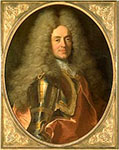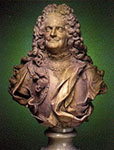|
|
Anton (Anthony) Ulrich
|
 |
Duke Anton Ulrich was the second son of duke August the Younger (1579-1666). Consequently, he was not at first destined to rule in Wolfenbüttel. In 1666 his older brother, Rudolf August (1627-1704), inherited the throne in the principality of Brunswick - Wolfenbüttel. Rudolf August, who actually lived only for the passion of hunting, was widely considered an intellectual. In 1685 Anton Ulrich was appointed joint ruler with Rudolf August and soon had the reins of power firmly in hand. Anton Ulrich understood that his plans and preferences succeeded in the face of his cautious and reserved brother. Among Welf rulers, duke Anton Ulrich was one of the most glittering personalities. He united in himself all the characteristics of an absolute ruler of the Baroque Age. From his father he had the propensity for scholarly research, and from his mother he inherited a joy for music and the theater. Under the guidance of his tutor, duke Anton Ulrich composed spiritual songs and wrote libretto and operas, which were performed at courtly family festivals. Already in the first years of his joint rule, he founded the knights academy, which was intended for the instruction of young noblemen. Behind the Wolfenbüttel castle he had a magnificent opera house constructed. In 1688 he began to build according the French model with the construction of the pleasure palace at Salzdahlum. The young architect Herman Korb completed the baroque palace plan in 1694. Korb created his masterpiece with the building of the library rotunda on the remains of the old stables in Wolfenbüttel. With this edifice duke Anton Ulrich established the first independent library building in Germany.
Ambition also determined the political affairs Anton Ulrich. He could scarcely get over the fact that in 1692 the Welf branch line of Hanover - Celle (New House of Lüneburg), in the person of duke Ernst August (1629-1698), received the ninth electorate of the Empire, which had been claimed by him. He remained politically active in opposing the ninth electorate until 1706, when he was formally reconciled with Ernst Augusts' son and successor, Georg Ludwig (1660-1727). Through adept marriage politics with his granddaughter, Anton Ulrich sought to take his small principality of Brunswick - Wolfenbüttel into the power politics of the Empire. Elisabeth Christine (1691-1750) was the daughter of his younger son, Ludwig Rudolf, and she eventually married emperor Karl VI. (1685-1740) and was thus the mother of empress Maria Theresa (1717-1780) in Austria. From his marriage with Elisabeth Juliane of Holstein - Sonderburg, duke Anton Ulrich had three sons, Friedrich August (1657-1676), August Wilhelm (1662-1731), and Ludwig Rudolf (1671-1735). Friedrich August died in the siege of Philippsburg. But August Wilhelm succeeded his father as ruling duke of Brunswick - Wolfenbüttel in 1714, and he was succeeded in turn by Ludwig Rudolf in 1731.
Sources
- Fürst, R. and W. Kelsch. Wolfenbüttel: Ein Fürstenhaus und seine Residenz. Wolfenbüttel, 1990.
- Hatton, Ragnhild Marie. George I: Elector and King. Cambridge, Mass.: Harvard University Press, 1978.
Web






